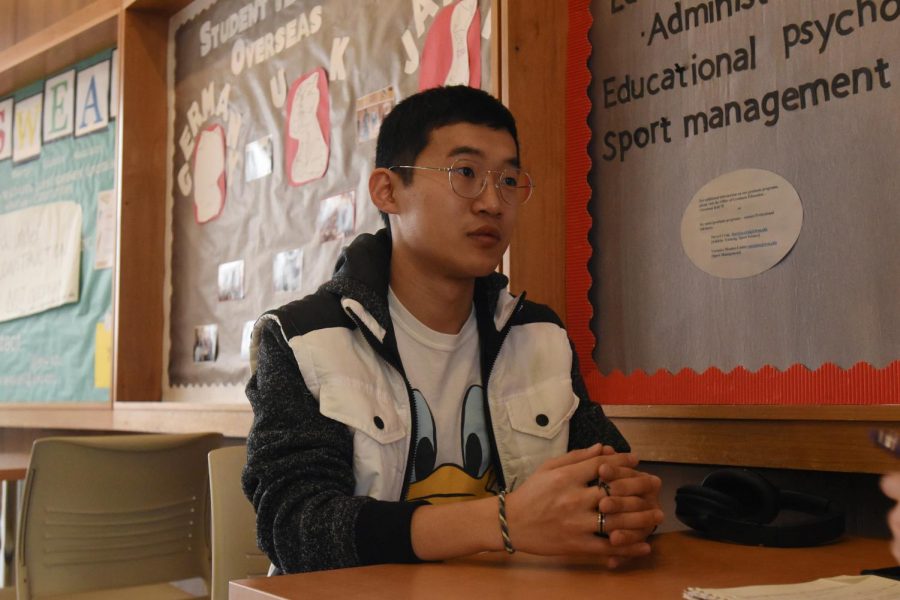WSU should support students on autism spectrum
ROAR program helps students, but not for those seeking degree
VENKATA SAI RAM ARIPIRALA | THE DAILY EVERGREEN
Xingyao Chen runs program for those with intellectual disabilities Jan. 17 in Cleveland Hall.
January 30, 2019
In every college student’s time at university, there comes a moment when they need extra support to get through an assignment, life event or difficult day — but is support available to students on the autism spectrum?
One program on campus, ROAR (Responsibility, Opportunities, Advocacy and Respect), works for students with mental disabilities to receive a customized education. These students earn a certificate rather than a degree. But there is no program specifically for degree-seeking, high-functioning students on the spectrum.
While the psychological services on campus are open to everyone, Xingyao Chen, an assisted living advisor for ROAR, had a hard time thinking of any support groups on campus for students on the autism spectrum.
“Is there any specific service for students with [neurological] disabilities?” Chen said. “To be honest, I don’t know.”
Brenda Barrio, co-founder of ROAR and assistant professor of special education, said the program is not for high-functioning or typical four-year students.
“[It’s for people] who wouldn’t be able to meet the requirements to get into the university,” Barrio said.
Barrio and co-founder Don McMahon, an assistant professor of special education, started ROAR last year.
Chen said ROAR is a two-year program that offers student-specific curriculum and gives people with mental disabilities the opportunity to get a feel for college life.
The main goal of the program is to help neurodivergent students — people who function differently on a neruological basis — gain independence to achieve their goals through activities and advising, he said.
A common struggle Chen sees in students in ROAR is the difficulty to adapt to a new lifestyle; a new environment with new people can induce anxiety.
Students are welcome to come to Chen and his colleagues for any assistance. The staff of ROAR, in turn, can offer workshops, social events and internship opportunities, among other things.
However, the ROAR program requires an application process and is mainly meant for students that are coming to college as freshmen.
But for students with high-functioning autism, there are not even support groups available to them on days when they are struggling.
Barrio said that, for any students who feel they may need extra help but don’t have time or the need for the intensity of the ROAR program, there may not be good options.
Searches on the campus website for clubs and organizations as well as the website for student organizations did not bring up anything about support groups for students on the spectrum. Meanwhile, there is plenty of support available for mental health issues like depression and anxiety.
“But,” Barrio said, “we’re getting better.”
Barrio said the University of Idaho has a “Ravens Scholars Program” that is specifically tailored to students on the autism spectrum. In the U of I program, students can participate in college life while receiving help with navigating the social demands of college culture, attending events, meeting with personal coaches, along with other helpful resources.
But the Ravens Scholars Program requires an application process, as well, in which the student seeking assistance would have to apply to both the university and the program itself.
The ROAR program is a shining example of support for some students.
However, WSU can continue “getting better,” as Barrio said, at exploring the unique needs of neurodivergent students. But until they do, high-functioning students on the spectrum are not receiving the support they need.












Zosia Zaks • Feb 3, 2019 at 3:20 am
While college may have been a special achievement that only a few people could access and complete, the world has changed: People need advanced education to succeed in many careers; we need the talent and potential of incredibly smart people who can’t sit at a desk. So yes, providing supports to get through college is a net win for society.
I do take issue with this article’s use of the term “high functioning”: The terms “high functioning” and “low functioning” put people in a box, reenforce stigma, and reflect neurotypical bias.
We run a program at Towson University for students on the autism spectrum. We have found consistently that when individuals receive the supports they need, the rest of us benefit from all they have to contribute to society.
If you would like more information on Towson University’s program, please contact the Hussman Center for Adults with Autism.
Best of luck,
Zosia Zaks
Manager of Programs and Education
Hussman Center for Adults with Autism
Towson University
Baltimore, Maryland
Anonymous • Feb 2, 2019 at 8:08 am
Please do not publish my name. My grandson is living alone in the dorm at WSU as a transfer student with an AA from Cascadia. He does not wish to be labeled “Autistic” but anyone who observes him rocking may identify him. While he will be able to meet the standards of the classes, he needs support for a few life skills such as reporting the thermostat in his dorm room broken. It says 60 degrees, but his room is hot! We remind him that he needs to wash his sheets but he has not done so since he moved in on Aug. 15th. Often, he forgets to comb his hair. Manual dexterity limits his ability to shave one side of his face. He seems to be happy in his first independent living but when pressed, tells us he is lonely. He yearns for friends. Unfortunately, his room does not open to a common area to meet others. We requested through Access, that he have a room to himself because of his need to talk nonstop and because his rocking may disturb a roommate. He will never drive but can ride the bus 5 hours to home for the holidays. He is smart but not a tech kid. Currently struggling to find help to learn Excel program. Yes, there should be some sort of support for students on the spectrum who are working towards a 4 year degree but are away from home support for daily living skills. He has proven himself a loyal worker (2 years back home at MOD) who will someday be a good employee.
Jeff Hanson • Jan 30, 2019 at 9:15 am
I would argue that the limit of a Universities support for students should be teaching. Either you can come and make it or you cannot, that’s why College was once considered to be an accomplishment rather than an expectation.